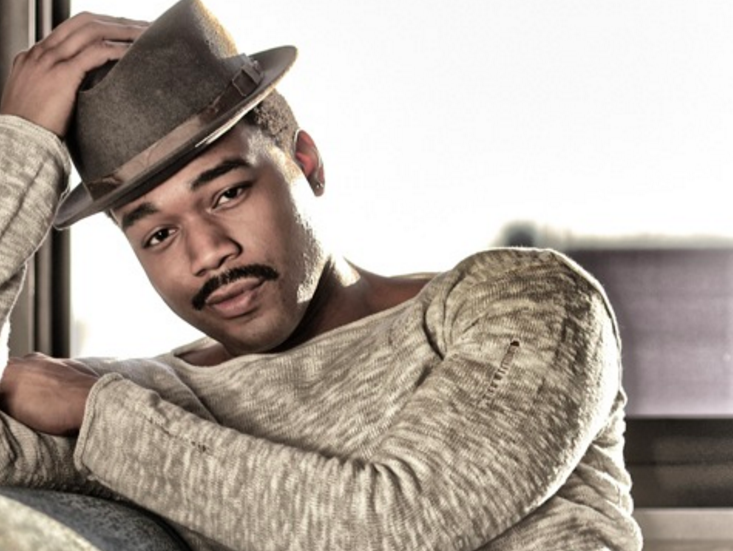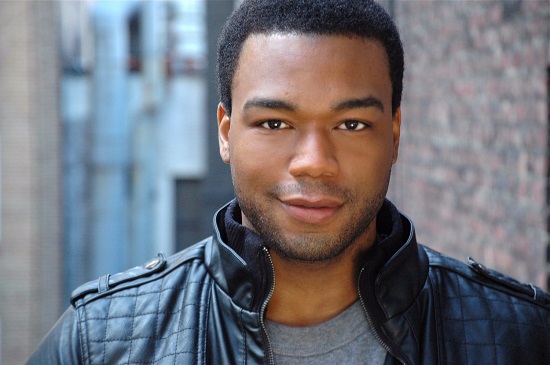

A Must See
Grasan Kingsberry: A Man Called to Dream, Create, & Love
Published
10 years agoon
Photo credit: Daniel Robinson
I sat down with Broadway performance artist Grasan Kingsberry to find out just what the key to his success and longevity on Broadway is. 10 Broadway credits to his name including Motown the Musical, Catch Me If You Can, The Color Purple, Dirty Rotten Scoundrels and Aida and one of a very small handful (he makes the fifth) of Broadway artists to ever, and I mean ever, reprise a role that they originally created, Grasan Kingsberry has set himself apart with great distinction. I went looking for just what his recipe might be, just what WAS his special ingredient? I expected the usual litany of hard work, dedication, and focus, but instead I found a man who has attained so much more than commercial success. He has a purpose and truly as the old folks say a calling. Kingsberry’s focus is on so much more than the next show, accolades or fame. He has turned being different into making a difference both in himself and through his art.
Kingsberry has always been different. Growing up as a kid with a dream in Charlotte, North Carolina, he had long been preparing for the stage. As a child, he fell in love with music and found himself picking through tunes by ear. By the time he was in high school, he had made his way into Northwest School of the Arts and also had been a stellar athlete throughout his matriculation through secondary school. Kingsberry spent his time at Northwest studying dance, music theory, musical theater, voice, piano, and acting.
Deciding that performance art was going to be his focus, he moved away from being an athlete, replacing that love of playing with becoming a super fan of the Carolina Panthers. But music and dance were calling him and his next stop would be at Julliard. He graduated from Julliard with a BFA and role in Broadway’s Aida. The tone had been set and Kingsberry was ready.
Today finds Kingsberry still making history. He is currently performing in the revival of The Color Purple. This is noteworthy because it’s such a rare occurrence that an actor reprises an original role. As an African American male his accomplishments are somehow brighter, somehow more inspiring simply because of his ability to stand out in what has always traditionally been “the Great White Way”. But talent as sumptuous as Kingsberry defies boundaries and heralds a new day where African American performers are more and more frequently receiving their just recognition for their contributions to the arts. Kingsberry has been a two-time recipient of the coveted gypsy robe; he received the first during On A Clear Day You Can See Forever and receiving the second on opening night of the revival of The Color Purple. Amazing enough he received his second robe four years and a day apart. “Timing is everything,” he says with the warmest of chuckles. Whatever Kingsberry puts his talent to just seems meant to be.
These synergistic themes of timing, mindfulness and intentional thinking pepper our conversation. It underscores Kingsberry’s deeply spiritual musings and convictions. Kingsberry is a man who has put a lot of thought into his purpose and his spiritual beliefs. Beliefs that he says became solidified during his very first run of The Color Purple and continue into the revival ten years later.
“This piece is really special to me. It was special to me ten years ago and it rings even more true to me now; in terms of a lot of things that I believe and things that have changed my heart from this show. Being a part of this show again just reconfirms my belief and my faith that you are where you are supposed to be. This show changed my life. The lyric content, the subject matter, the story… it raised questions of faith and self-love and finding joy through pain.”
As he circles around to breathe life into the revival, I ask him how the two shows are different. Kingsberry shares that the current revival is sharply pared down compared to the original. There are 17 actors on stage and 3 swings and this time, no choreographer. In fact, there is only one set piece and chairs that are used as props. Kingsberry doesn’t discount the previous lavish set replete with 30 actors. He says,
“I think we needed that production to know what this production was going to be, we needed the original to come to this, to what we have now. We approach it like a play. Things really move at the pace a traditional Broadway play would. And that’s how I approach it as an actor, too.”
I asked Kingsberry what else was different in his approach to his character.
“So to do it ten years later with ten years of life experience, ten years of career experience, I get to apply those things that I have learned and give new life to this character and new life to this show. I have the unique position of having been in both shows so I can apply the things I have learned that I didn’t apply to this one. I had to approach it in a new way.”
For the audience, particularly those who have seen both productions the intent is to focus on Celie. The play has an intimate feel and there is no doubt there is an element of God in the show. The relationships between the characters, the emotional content are all focal points in the revival of a show that has a storyline that spans forty years. The emphasis in this production is a desire to trust the audience to imagine what they needed to and to get rid of the superfluous to hone in on what is truly an awe-inspiring story. According to Kingsberry, this approach is effective. He adds,
“Theater is a world of imagination and we don’t need to be too literal because we have to trust the audience will understand what’s going on. We as actors have to make sure we do our job and understanding the intention behind the story.”
Kingsberry says that in the revival, audiences have been able to get closer to the characters and the storyline. Being able to absorb more of the emotional elements sans a fancy set allows them to really hear the story and it hits them harder. It’s a spiritual experience that Kingsberry shares.
“What opened my spiritual door, so to speak, was me asking questions. Once I got the show ten years ago, with Oprah coming on board, with just all the goodness surrounding the show, I just kept asking the question, why me? God, why me? What have I done to receive all of these amazing blessings and beautiful things? The more I asked that and the more I sat still with that, answers began to reveal themselves to me. So, it deepened my spiritual practice and thusly I had an awakening. Because of the show.”
And we are back to this idea of having a sense of worship and understanding of the true nature of God. Kingsberry cites listening to the lyrics Shug sings to Celie about God being inside of each of us. This was a poignantly different picture of the God of Kingsberry’s childhood who was often portrayed as an overbearing, distant deity somewhere off in the sky. The simple message of God and love has had a profound effect on the way Kingsberry views God. He now says that we are the essence of God and that our work is to glorify the creations of God, the beauty of God and the love of God.
“It was truly this show that broadened my spiritual awakening… You do this eight times a week and you really start to believe what you are saying, to really take in what you are saying and naturally it manifested into me having a really deepened spiritual practice now. What I do on stage is all of God’s work.”
Speaking with Kingsberry is much like sitting by a small relaxing brook with an old friend, far away from the bright lights and buzz of the big city. His intelligence, humility, and deep spirituality stand in stark contrast to the hustle and bustle that defines the life of a Broadway entertainer. Kingsberry has managed to forego the ego and bravado and his humanity shines through powerfully in every word.
Thematically, a pattern seems to present itself in his recent work. One of artistic activism that gently points to what he truly believes is the intersection of all of the societal ills. Prior to joining the cast (again) of The Color Purple, Kingsberry played Sam Cooke in a play called One Night in Miami. The story was about Sam Cooke, Malcolm X, Cassius Clay and Jim Brown electing to forego a celebration after Clay wins the heavyweight championship. The four friends skip the pompous festivities and instead spend the evening together in a hotel in the heart of the Black neighborhood that Clay trained in for the bout. The play is an imagining of what happened during that night in 1964. I asked Kingsberry who would he spend his ‘One Night in Miami’ with and his answer was powerful, thoughtful and sentimental. Alice Walker whom he says he could talk with for hours, his reverend Dr. Michael Bernard Beckwith who is the Founder and Spiritual Director of the Agape International Spiritual Center and his own father. I can hear the strong emotion in his voice when he talks about what such a night might entail. When speaking about why he chose to include his father he gets a bit teary eyed.
“I would want him to experience it and I would also want to learn more from him and his upbringing. It would be a cool way for us to bond.”
Grasan Kingsberry is a history maker. There is no denying his success on Broadway but in truth, his real heroism comes from how he views the world and the importance of everyone in it. His loving approach to the work he does and his commitment to select thoughtful pieces communicate important and complex ideas at a time where truthfully, he could focus on doing anything he wants. Grasan Kingsberry has a calling and we are definitely better for listening to what he has to say through his artistic expressions.
You can catch Kingsberry in the ensemble and as Adam/Buster on Broadway in The Color Purple. Meanwhile, we will be on the lookout for upcoming music projects and other performances showcasing his musical talent.
Nicole "Blackberri" Johnson is a freelance writer, stage/ film actress, activist and entrepreneur. Mom of three. Blackberri is also a notorious cape thief and unapologetic bacon lover. Follow on twitter @Blackberri

You may like

[vc_row][vc_column][vc_column_text]Playwright, educator, opera singer, and Queen, Mfoniso Udofia has two plays running at New York Theatre Workshop. *pause* TWO PLAYS. In the SAME season!?!? *ends congratulatory gasp* Sojourners and Her Portmanteau are performed in repertory, as two chapters of Udofia’s sweeping, nine-part saga, The Ufot Cycle. Admittedly, before researching each show, I didn’t know the definition of either word; and in the spirit of keeping it consistent with the honesty, I didn’t like either play. I loved them.
Sojourners
Minimalism seems to be the name of the game these days. I sat down to a completely black stage, sans a multimedia display lodged on the ceiling at a 45-degree angle. Clutching my all white program and bobbing my head to the ‘70s pop rock pre-show music, I prepared my heart for the story of Sojourners, well at least that was the plan. The stage begins to rotate and we meet Abasiama (Chinasa Ogbuagu) and Ukpong (Hubert Point-Du Jour), Nigerian expatriates sojourning in Houston, Texas with the plan to start a family, earn their degrees, and go back to Nigeria until life happens.
Charming and handsome, Ukpong becomes defined by his leather jacket, shoulder work and shimmy which match the fascination and yearning for freedom that illuminates his eyes every time he talks of peace, protest, and Prince–all shaping his view of 1970s America, and consequently, the American Dream. But does leather compensate for grit? Is a movement or vibe really a panacea for disappointment, aimlessness, and a need to find yourself? Abasiama enters the play pregnant, purposed, and outfitted in pieces of Nigerian garb, grounded in duty showing a stark contrast to Ukpong who floats in desire. What’s lost in your household is found elsewhere, and this is when we start to see, and root for, Abasiama’s transformation from timid to tenacious.
Enter Moxie (Lakisha May), a colorful prostitute turned protector and friend. There is a mutual respect despite great differences between her and Abasiama, with their love for one another creating moments that make you believe in the beauty of humanity. Enter Disciple (Chinaza Uche), another warm and determined hearted immigrant who has come to the United States to study, rounding out the timely additions of love, support, and security when Abasiama needed them the most.
Through and through this is Abasiama’s story and she glows. Her kindness, her sisterhood, her strength, her worthiness, and the realization of her American Dream, guide her decisions—which is the catalyst behind the entire Ufot Cycle.
Her Portmanteau
Her “portmanteau”, or red suitcase, makes a return as 30 years have passed. Abasiama now has two daughters, one raised in America and the other who has come from Nigeria to reconnect with her family.
This is a good moment to mention that each story is informed by the other, but can certainly stand alone on substance, content, and the amazing direction of Ed Sylvanus Iskandar. The staging is exciting and deliberate, while minimal, putting the full focus on the tension and growth to be expected of a family reunited after a substantial amount of time and distance.
Chinasa Ogbuagu returns to the stage, this time as the American-born daughter, Adiagha Ufot, Adepero Oduye as Iniabasi Ekpeyoung (Ukpong and Abasiama’s daughter), and Jenny Jules as the mother, Abasiama Ufot.
Seated on a couch in Adiagha’s small New York Apartment, no amount of preparation readies your mind and spirit to form the words to make up for 30 years of life, connection, and memories missed. We’re taken on a ride of resentment, hurt, love, and forgiveness, as the portmanteau is literally unpacked. We watch the teeter-tottering between offense and defense as one sister tries to assimilate into American culture, and the other attempts, albeit stubbornly, to fall in formation in honoring a family she shares blood with, but little time or tangible history.
It’s powerful to see a story of history and continuing a legacy despite lost time, faulty promises, and difficult choices explored with an all-woman cast as far too often the idea of legacy is framed in patriarchy. Jules admirably takes Abasiama through the fire to heal, to feel, and to fix her family. The narrative allows us to empathize and understand the struggle that comes with upholding family values versus cultivating a space to achieve personal dreams and happiness.
Her Portmanteau (and Sojourners) is written in a way that finds your soul, gently massaging it with humor, while leaving it with very real questions. I’ve never felt a greater need to binge read nine stories and simultaneously study the story of my own family tree. I left changed. I left wrapped in the strength of my mom and my mom’s- mom’s sacrifice. I left pensive and with seeds of future forgiveness planted. I left changed.
For capturing our hearts with wit and with truth. For putting Black women at the center of a poignant narrative. For unapologetically telling a story you haven’t seen told and telling it in the way you want it to be told.
We thank you Mfoniso. We thank you.
Have you seen the #duetplays? Sound off in the comments below![/vc_column_text][/vc_column][/vc_row]
A Must See
Our Story in 2 Plays for 1 Price: Mfoniso Udofia’s Sojourners & Her Portmanteau
Published
9 years agoon
May 8, 2017
Last winter, we reported on Sojourners by playwright Mfoniso Udofia, a new play about a Nigerian family who has come to America with the goal of earning a college education, starting a family, and returning to Nigeria. But not without the twists and turns that come along with every plan that seems straightforward.
Thanks to New York Theatre Workshop, we get to relive this moment and continue the dialogue, decades later, with Her Portmanteau. Performed in repertory, these two chapters of Udofia’s sweeping, nine-part saga, The Ufot Cycle, chronicle the triumphs and losses of the tenacious matriarch of a Nigerian family.
Ed Sylvanus Iskandar directs the two-part story in association with The Playwrights Realm, who premiered Sojourners last winter in a limited engagement world premiere production. Her Portmanteau also received the 2016 Edgerton Foundation New Play Award grant.
The cast includes Jenny Jules, Lakisha Michelle May, Adepero Oduye, Chinasa Ogbuagu, Hubert Point-Du Jour, and Chinaza Uche.
As if that wasn’t enough to get excited about, we have an exclusive deal for our Broadway Black readers!
Our Story in 2 Plays for 1 Price!
Yes. That’s two shows for one price! The discount code BWYBLACK will take 50% off tickets to ANY performance(s) if purchased by May 15th!
Go ahead and grab your tickets. We have ours!
Sojourners and Her Portmanteau plays at NYTW until June 4th.






